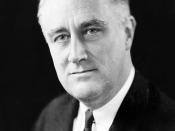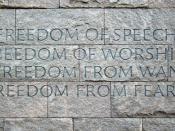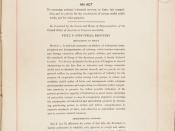New Programs:
Franklin Delano Roosevelt and his programs in the New Deal changed the attitude of the average citizen toward the role of government a great deal. First, it marked the first time that a president really focused on what the "average" citizen wanted, and then set goals in order to help improve the life of the average citizen. FDR related to the masses in radio announcements and his political speeches as he described all of the problems the average citizen has, and how he is going to help to prevent these problems from occurring. He gained the trust of the majority, and kept that trust throughout his stay in the White House.
The programs that FDR set forth in the New Deal helped the American people by instilling trust in the federal government. The Emergency Banking Act was established in order to help Americans believe in the banking system, and use it correctly therefore we would not suffer from a major depression like we had already.
Americans were no longer scared that they would lose all of their savings in a bank failure. Government inspectors found that most banks were healthy, and two-thirds were allowed to open soon after. After reopening, deposits had exceeded withdrawals.
The Civil Works Administration gave the unemployed jobs building or repairing roads, parks and airports. The Civilian Conservation Corps was an environmental program that put 2.5 million unmarried men to work maintaining and restoring forests, beaches, and parks. Workers earned only $1 a day but received free board and job training. From 1934 to 1937, this program funded similar programs for 8,500 women. The Civilian Conservation Corps taught the men and women of America how to live independently, thus, increasing their self-esteem. Many of FDR's programs in the New Deal not only bettered America,


